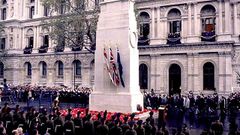Difference between revisions of "Remembrance Sunday"
(Remembrance Sunday at the Cenotaph) |
m |
||
| Line 5: | Line 5: | ||
|image_width=240px | |image_width=240px | ||
|image_caption=[[Remembrance Sunday]] at the [[Cenotaph]] | |image_caption=[[Remembrance Sunday]] at the [[Cenotaph]] | ||
| − | |start= | + | |start=9 November 1919 |
}} | }} | ||
'''Remembrance Sunday''' is the closest Sunday to 11 November, which was the day that a final armistice was agreed between the belligerents of [[World War 1]]. | '''Remembrance Sunday''' is the closest Sunday to 11 November, which was the day that a final armistice was agreed between the belligerents of [[World War 1]]. | ||
Revision as of 15:21, 9 November 2018
 Remembrance Sunday at the Cenotaph | |
| Start | 9 November 1919 |
| Subpage(s) | •Remembrance Sunday/A meditation |
Remembrance Sunday is the closest Sunday to 11 November, which was the day that a final armistice was agreed between the belligerents of World War 1.
Armistice Day is also commemorated every year on 11 November to mark the agreement signed between the Allies of World War I and Germany at Compiègne, France, for the cessation of hostilities on the Western Front, which took effect at eleven o'clock in the morning - the "eleventh hour of the eleventh day of the eleventh month" of 1918. The armistice initially expired after a period of 36 days. A formal peace agreement was only reached when the Treaty of Versailles was signed the following year on 28 June 1919.[1]
Remembrance Day services are held each year throughout the UK on 11 November, with the main national service held on a Sunday at the Cenotaph in Whitehall, London.[2]
Related Documents
| Title | Type | Publication date | Author(s) | Description |
|---|---|---|---|---|
| Document:Remembrance Day and the truths that dare not speak their name | blog post | 8 November 2018 | John Wight | If Remembrance Day imparts a message worthy of our collective intelligence it is that war should be made a crime, with those who instigate it punished as criminals. In the last analysis it does not determine who is right only who is left. We have met the enemy and he is us. End. |
| Document:The Red Poppy is Not About Remembrance | article | 2 November 2018 | Tommy Sheridan | A polemic on the militarisation of remembrance of the horrors of war represented by UK Establishment promotion of the red poppy and its associated ceremonies on 11 November each year |
| Document:Those who flaunt the poppy on their lapels | article | 5 November 2011 | Robert Fisk | Why Robert Fisk stopped wearing a red poppy |
| Document:Why I wear a white poppy | article | 9 November 2018 | Peter | A summary of the reasons why the author wears a white poppy during the UK Remembrance Day commemoration. |
References
- ↑ Shushkewich, Val (12 September 2005). The real Winnie : a one-of-a-kind bear. Natural Heritage Books. p. 42. ISBN 9781554883509.Page Module:Citation/CS1/styles.css must have content model "Sanitized CSS" for TemplateStyles (current model is "Scribunto").
- ↑ "Banquet in honour of The President of the French Republic, Monday 10th November 1919"